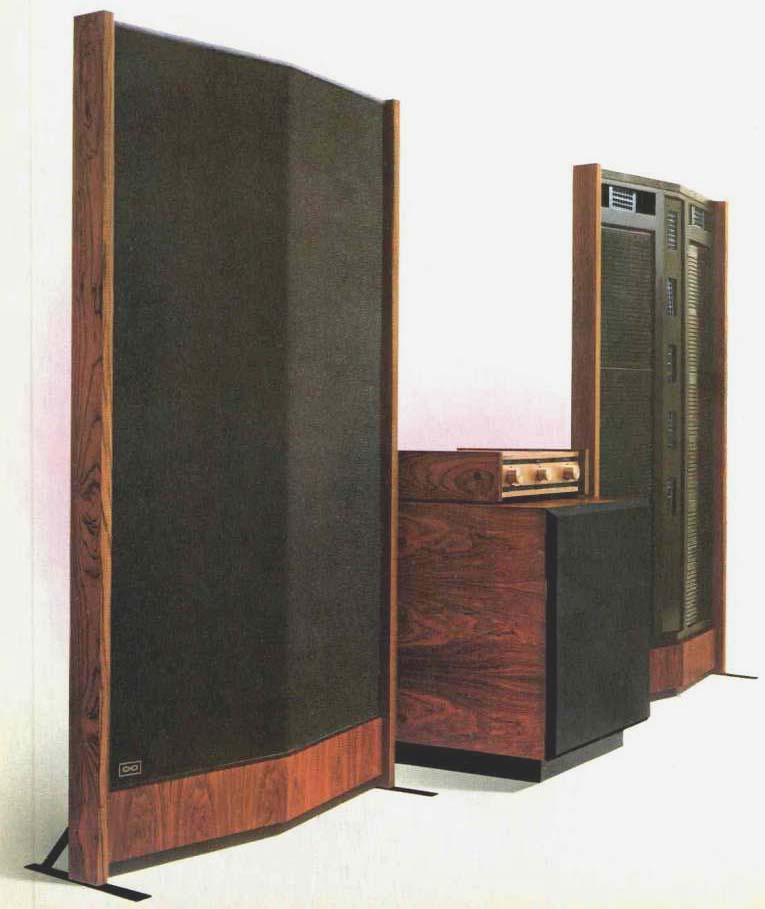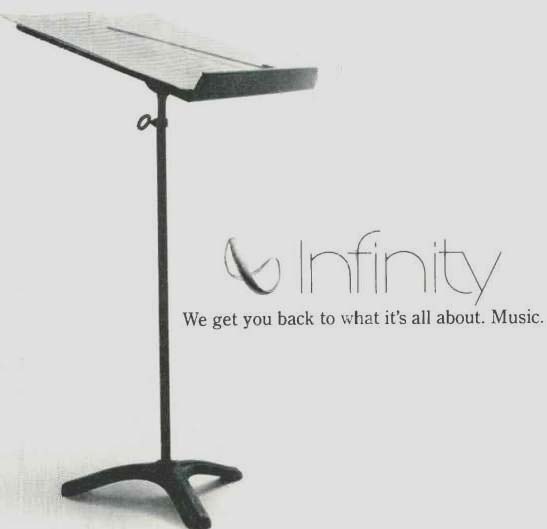Announcing -- The speaker that wasn't made to sell.
INFINITY'S SERVO STATIK 1A

Not very long ago, before Infinity Systems was Infinity Systems, it was a small group of extremely dissatisfied, conceptually exotic, pig-head-stubborn aerospace-physicist/music freaks in a garage.
Our dissatisfaction was with the sound and inherent distortion in all existing speakers.
Our exotic concepts promised an entire new technology of audio electronics.
And our obstinate nature made us push those Lorelei theories into a unique realization: the Servo Statik 1.
We developed the Servo Statik for one reason to create the world's finest medium of audio reproduction, regardless of cost. For ourselves, really.
We figured we could then use this new proprietary technology primarily as a reference standard -- benchmark technology, enabling us then to create a popular-priced line of vastly superior-sounding speakers.
We didn't figure people would actually line up to buy the appallingly expensive Servo Statik 1.
We were wrong.
The mystique grew. And so did Infinity.
Now we are announcing the Servo Statik 1A. Without fear of contradiction we can state that no speaker ever made is as distortion-free, as accurate, as capable of as wide a dynamic range and as great a frequency response as the Servo Statik 1A. The system consists of two electrostatic screens which produce tones from 70 Hz to 40 kHz, a separate bass cube producing tones from 15 to 70 Hz and a servo bass amplifier/electronic crossover.
Its 15 Hz to 40,000 Hz power bandwidth means it produces the full sonorities of the 64 foot diapason (the largest pipe of a cathedral organ) as well as the inaudible but vitally important orchestral overtones.
Its 114 dB peak sound pressure levels means it can fully reproduce the transient peak of every section in the symphony orchestra, the full volume of a concert grand piano in the same room, or the raging, raunchy thrust of the most punching rock sound.
Its midrange and high frequency electrostatic modules are angled to provide horizontal and vertical dispersion-creating a life-breathing concert-hall ambiance that is unrivalled.
Its separate Brazilian rosewood veneer bass cube houses an 18" woofer with a 35 lb. magnetic circuit and a motion sensor as the heart of its servo mechanism system. The servo woofer, driven by its own 150 watt RMS DC servo amplifier, generates unparalleled distortion-free bass reproduction; articulate, tight and accurate.
Its electronic crossovers with high voltage FETS, and crossing over at 70 Hz and 2,000 Hz, provide perfect phase linearity over the entire musical spectrum.

In its unprecedented homogeneity and musicality, the Servo Statik 1A is a staggering achievement.
It costs $3,200. Yet you don't have to spend $3,200 to get typical Infinity clarity, transparency and depth of sound.
As we said, one of our objectives in conceiving the Servo Statik 1A was to develop a benchmark technology for a more "realistically" priced line of speakers.
The result? Every Infinity speaker, from the POS II at around $100 to the Monitor H at about $450, has achieved superlative reviews from leading testing labs and audio reviewers.
Very soon Infinity will top these technological achievements by introducing the DSP Switching Amplifier--not just a new amplifier, but a new concept of amplification; an esoteric technology that will have far-reaching effect in the audio and music industries.
We've restricted sales of the Servo Statik 1A to a select family of dealers. Drop us a note and we'll be happy to tell you the Infinity dealer nearest you.
We hope you'll treat yourself to the experience of listening to the Servo Statik 1A. Or any Infinity speaker.
You'll discover a totally new phenomenon: live music without the musicians.
We get you back to what it's all about. Music.
©1975 Infinity Systems, Inc., 7930 Deering, Canoga Park, Ca. 91403 / TWX 910-949-4919
(Source: Audio magazine, Aug. 1975)
Also see: , Infinity speakers (Nov. 1977) and Infinity Reference Standard V speakers (Jan. 1990)
= = = =